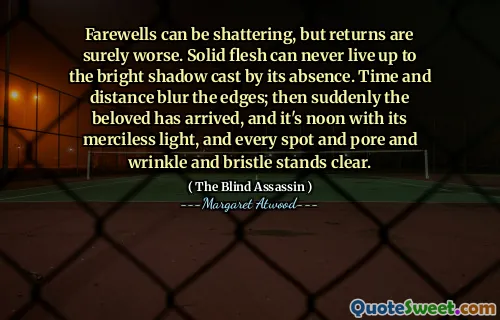Many believed what they were told: that the welfare of the entire kingdom depended on their selflessness.
In "The Blind Assassin" by Margaret Atwood, the narrative reflects on how people often accept the information given to them without question. This blind trust in authority leads individuals to believe that their personal sacrifices are crucial for the greater good of society. Such convictions can create a culture where selflessness is revered, even if it comes at a personal cost.
This dynamic highlights the tension between individual desires and societal expectations, illustrating how narratives can be constructed to manipulate public perception. The characters grapple with their roles and the weight of these beliefs, which shapes their actions and the course of their lives within the kingdom.


